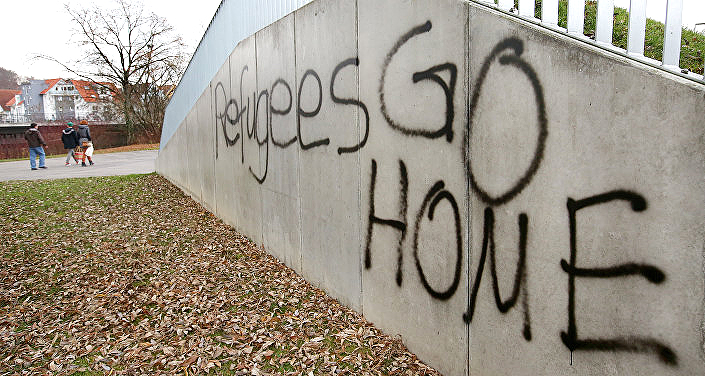Effect of EU-Turkey refugee deal debated

An anti-refugee graffiti is sprayed onto a wall in Sigmaringen, southern Germany.
In the first week of April, nearly 300 refugees were deported to Turkey in accordance with a new deal between the country and the European Union, but some scholars who study the issue have questioned whether this measure will be adequate to address the largest refugee crisis Europe has seen since World War II.
Nando Sigona from the University of Birmingham said: “The refugee crisis has multiple drivers and is not homogeneous. Data show significant variations according to routes and over time in terms of national, gender and age profile of arrivals.”
Refugees are migrating not only for safety but also for the hope of a new life, wrote Heaven Crawley, a professor from the University of Coventry, on the website The Conversation.
“The EU-Turkey deal and its implementation need close scrutiny,” Sigona said. “There are numerous concerns in terms of respect for human rights as well as international and European legislation that have been validly raised by international organizations, such as the UN refugee agency. Besides this, one may also question the capacity of the parties to implement the plan and whether it can effectively stem the flow of refugees or just divert them to more dangerous and deadly routes.”
Zhao Chen, a research fellow at the Institute of European Studies under the Chinese Academy of Social Sciences, said that the EU policy on refugees did not deliver the intended results. Most European countries, except for Germany and Sweden, failed to fulfill their promises. After the terrorist attacks in Belgium, some countries, such as Poland, publicly reneged on the deal. Furthermore, the logistical costs of the EU-Turkey deal are high, and the quota of 72,000 refugees fails to address the fundamental problems, Zhao said.
“It is fundamentally a Syrian refugee crisis and a negotiated solution to the conflict is the only real solution to the crisis,” Sigona said. “For now, what Europe and the world can do is to provide adequate protection to people fleeing the war. Many feel the EU-Turkey deal doesn’t provide enough reassurance that this is the case.”
Zhao argued that the EU-Turkey deal sends a message that the European Union is no longer a safe haven for refugees from Syria, Iraq and other war-torn areas. The refugees are expected to stop risking their lives for a ticket to the European Union. This deal is also meant to ease concerns among the European populace and reassure them that the EU government is capable of managing the crisis, he said. Zhao suggests that the crisis will not likely be resolved in the near future.
Yao Xiaodan and Zhao Yuan are reporters at the Chinese Social Sciences Today.

 PRINT
PRINT CLOSE
CLOSE